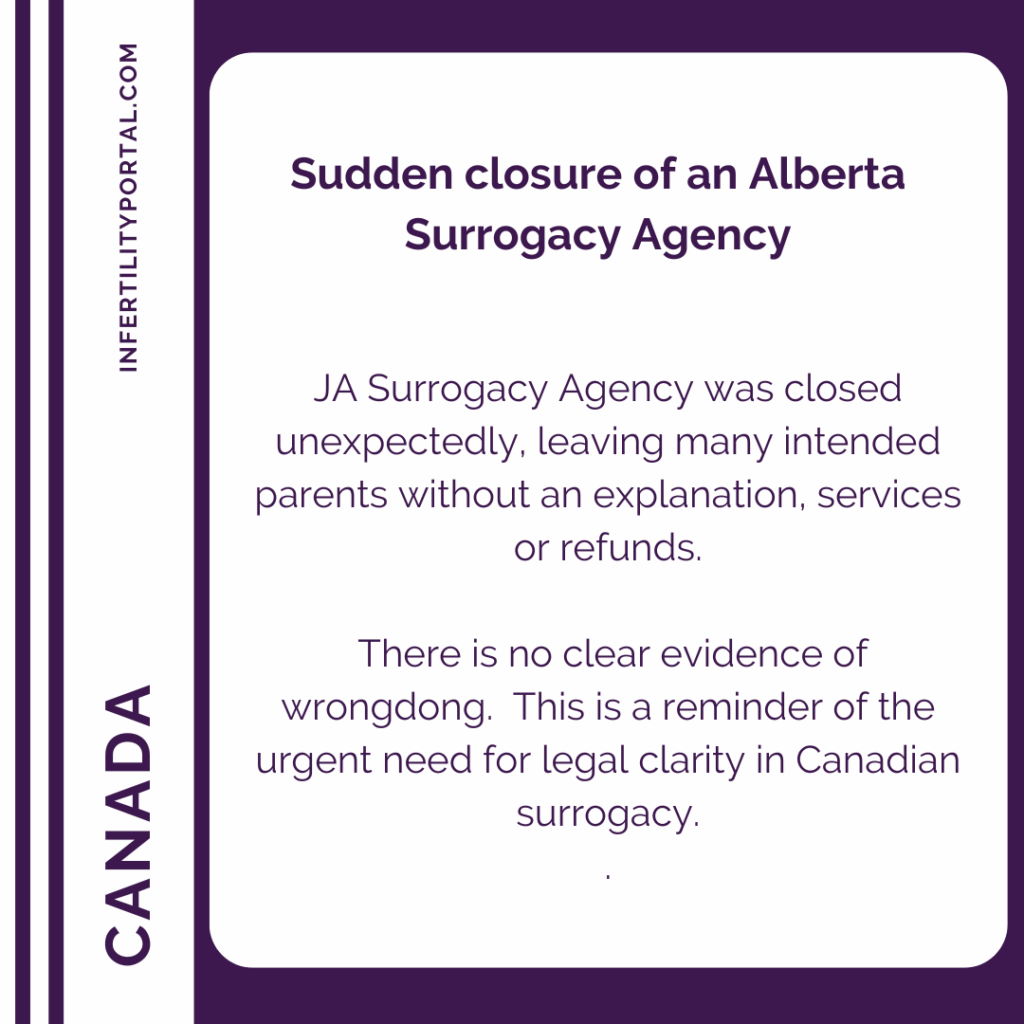The Closure of JA Surrogacy: A Cautionary Moment for Canada’s Surrogacy Framework
The unexpected closure of JA Surrogacy, an Alberta-based surrogacy consulting agency, has stirred concern and confusion among intended parents and professionals across Canada. While the details remain limited, this event highlights a deeper issue that has long needed attention: Canada’s legal and regulatory framework for surrogacy services.
A Loss Followed by Uncertainty
JA Surrogacy was founded by Jennifer Allen, who was known for her commitment to supporting intended parents and surrogates. Her unexpected passing in 2023 was a significant loss to the community. In the aftermath, her husband, Phil Allen, stepped in to continue the agency’s work. Phil was likely motivated by a desire to preserve her legacy and continue helping families.
Despite what appears to have been a genuine effort, the agency struggled to stay afloat. Reports indicate that JA Surrogacy incurred significant debt and ultimately ceased operations. The situation has sadly left some families feeling abandoned and financially impacted. However, there is no evidence of malicious intent or wrongdoing at this early time. Rather, this appears to be a case of someone trying to continue meaningful work without the necessary infrastructure, professional experience, or support.
A Broader Reflection on Legal Gaps
The closure of JA Surrogacy is not an isolated problem, nor is it a reflection on the ethics or viability of surrogacy in Canada. On the contrary, Canada’s altruistic surrogacy model has supported thousands of families and built strong relationships grounded in trust, empathy, and mutual support.
However, the legal framework that governs Canadian surrogacy agencies remains underdeveloped. Under current law, agencies are not allowed to charge for matching or recruitment services, and compensation to surrogates is tightly restricted. Instead, agencies often charge “consulting” or “administrative” fees—fees that may not be tied to clearly defined services or deliverables. This may make accountability difficult when services are not performed or when businesses close abruptly.
Families affected by such closures may be left with limited legal recourse, not because the system failed in one specific case, but because the system lacks clarity and structure overall.
Time to Recognize Reality and Modernize the Law
Surrogacy is no longer a fringe or emerging option. Instead, it is a well-established path to parenthood for many in Canada. As such, it deserves a modern legal framework that reflects current realities.
-
Agencies should be permitted to charge reasonable fees for professional services that are clearly outlined.
-
In turn, they should be responsible for delivering those services, and failing to do so, they should provide refunds when they cannot.
-
Intended parents and surrogates
-
Professionals working in this space deserve guidelines that help them operate with confidence and transparency.
Moving Forward
The JA Surrogacy case is a reminder of how fragile things can become when personal tragedy intersects with business responsibility in a space lacking formal safeguards. It is not necessarily a story of failure, but it is certainly a signal that Canada’s laws need to evolve.
Surrogacy is here to stay in Canada. It is time to formally acknowledge that by updating the legal framework in ways that protect all participants —intended parents, surrogates, and professionals alike.


